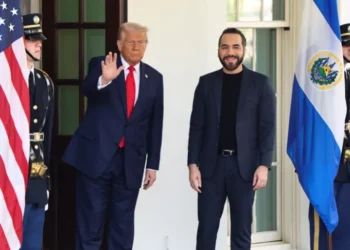As U.S Vice President Kamala Harris steps into the spotlight as the new Democratic presidential nominee, she finds herself at the crossroads of a critical issue that could shape her campaign’s future: the ongoing conflict in Gaza.
The “Uncommitted” movement, which captured national attention with its innovative protest-vote strategy earlier this year, is now leveraging its significant influence to demand clarity on Harris’s stance regarding the Gaza conflict and U.S. weapons transfers to Israel.
Leaders of the “Uncommitted” protest-vote movement in Michigan have said that they will not endorse Harris – who replaced Joe Biden atop the Democratic presidential ticket – until she clarifies her stance on a ceasefire in Gaza as well as weapons transfers to Israel.
The campaign, which gained national attention by urging voters to cast “Uncommitted” ballots in a message to Biden during the Democratic Party’s primaries earlier this year, is particularly influential in the battleground state of Michigan.
More than 700,000 Americans, including 100,000 in Michigan, heeded the campaign’s call, and it is set to send 30 delegates to the upcoming Democratic National Convention in Chicago.
The movement, which drew over 700,000 votes nationally and mobilized 100,000 in Michigan, is not to be underestimated.
As the campaign prepares to send 30 delegates to the Democratic National Convention in Chicago, the spotlight is on Harris to address these critical issues head-on.
Abbas Alawieh, a co-founder of the movement, told reporters in Dearborn that the campaign wants to know how Harris’s policy “is outwardly different from the disastrous policy that we’ve seen unfold over the last nine months.”
He added that the uncommitted movement would not endorse Harris for president unless she “[tells] us where she stands on Gaza and on the issue of weapons transfers specifically, so that we know what message we can take back to the voters that we mobilise here in Michigan.”
This demand is not merely a political maneuver but a reflection of deep-seated concerns about the current administration’s handling of the conflict and its implications for U.S. foreign policy.
The Gaza conflict, with its complex and deeply entrenched dynamics, is a flashpoint for many voters who are increasingly disillusioned with the status quo.
Harris’s challenge is to navigate these concerns while balancing the broader interests of her campaign and the Democratic Party. Her response will be closely scrutinized by both the movement and the electorate at large.
Addressing these issues directly and transparently could not only sway the support of the “Uncommitted” campaign but also set a tone for her presidency on how she intends to handle complex international issues.
By engaging with the concerns raised by the “Uncommitted” movement and offering a clear, principled position on Gaza, she has the chance to connect with voters who are seeking a shift from the past policies and a more ethical approach to U.S. involvement in global conflicts.
Pro-Palestine Protesters Heckle Harris At Detroit Rally
Kamala Harris and her running mate, Minnesota’s Governor, Tim Walz, continued their swing-state tour with rallies in rural Wisconsin and Detroit, Michigan, which the campaign said brought out more than 10,000 people each.
The rallies did see some shaky moments as protesters in the Detroit crowd tried to disrupt Harris’ speech.
According to US media, the Democratic presidential nominee was speaking in Detroit, Michigan, when half a dozen protesters began chanting, “Kamala, Kamala, you can’t hide. We won’t vote for genocide.”
The interruptions were the first Harris has encountered at a rally since she replaced US President Joe Biden on the Democratic ticket.
Harris responded to the protesters by saying, “I’m here because we believe in democracy. Everyone’s voice matters, but I am speaking now. I am speaking now.”
As the protest continued, Harris said, “You know what? If you want Donald Trump to win, then say that. Otherwise, I’m speaking.”
In the coming days, as Harris prepares to address these pressing issues, the clarity and substance of her position will be paramount. Harris’s response will be pivotal in shaping her campaign’s trajectory and her potential presidency.
READ ALSO: Reimagining the Gulf of Guinea Commission for a Brighter Future




















